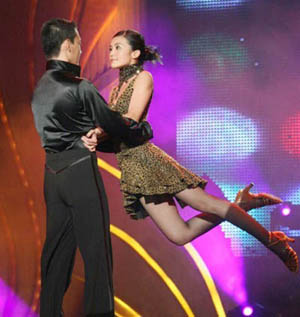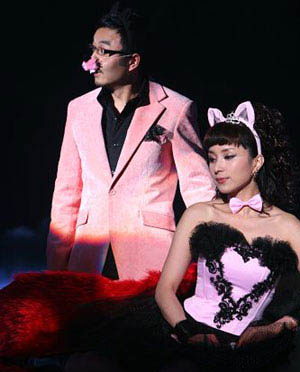| Home / Entertainment / News | Tools: Save | Print | E-mail | Most Read |
| Innovation Required for Chinese Reality Shows |
| Adjust font size: |
In recent years throughout China reality TV shows have become some of the most watched programs aired by the country's stations. Successful reality programming gets high ratings, brand recognition and big profits for TV stations, program producers and sponsoring companies. But with fiercer competition, eager to satisfy audiences these reality shows now require to be more innovative and diversified to guarantee future success.
A Sa (R), member of Hong Kong singing duo Twins, performs on the stage of Dragon TV's "Let's Shake It." Last year Shanghai's Dragon TV launched a dance competition show called "Let's Shake It" to snatch ratings away from Hunan TV's hit national singing competition show "Super Girl." Benefiting from Shanghai's dance tradition the new show became a big hit among local audiences. This was in part thanks to the appearance of celebrities. At the end of last year a report was published that analyzed the value of Dragon TV's four reality shows including "Let's Shake It." The direct returns amounted to 1.4 billion yuan (US$179.5 million). The success was helped by an "industrial-like" chain of program producers, brand management companies, SMS services and entertainment companies. "Let's Shake It" alone has earned 1.2 billion yuan (US$153.9 million) for those involved. Besides huge profits these reality shows also helped promote China's cultural industry. Li Lan, of the State Administration of Radio, Film and Television's research center for development and reform, pointed out that Dragon TV's reality shows not only made its brand more competitive but also built up an industrial-typed chain combining integrated entertainment sources.
Famous TV show host Wang Han (L) and folk singer Tang Can (R) are playing at Hunan TV's reality show"Just the Two of Us." One of the reasons for the success of the show was that it shifted the limelight from contenders, who were ordinary folk, to star competitors. It put big names into positions normally taken by ordinary people. This year Hunan TV introduced another singing competition "Just the Two of Us" from BBC Worldwide, which also features star contenders. The show invited 16 stars to participate in eight groups. Each group includes one professional singer and an actor or actress. The result will be decided by judges' marks and TV audience votes. One group will be eliminated after each round. The show has entered its fifth round and its ratings are reasonably good. Dragon TV is being even more ambitious this year. On January 12 it'll launch another reality TV show -- "Fei Chang You Xi" -- which puts traditional Chinese opera into TV competition. Hyped as promoting traditional culture and opera the show, with such a unique content, is looking promising. Regarding this year's trends for reality shows the general manager of Dragon TV, Xu Wei, predicted, "China's TV programs have a big market to develop. There'll be more reality shows this year. Both the quality and value chain of the shows have a lot of room to grow. However, risks still remain." Professor Yi Hong from Tsinghua University analyzed the risks. He said more reality shows will be produced this year but it would be difficult to overtake established brands and formats. Producers had to consider other show formats including those related to lifestyle and travel. "In 2007 reality shows are expected to develop by involving imitation, competition and elimination," Li Lan said. (CRI.cn January 12, 2007)
|
| Tools: Save | Print | E-mail | Most Read |
 |
| Related Stories |

